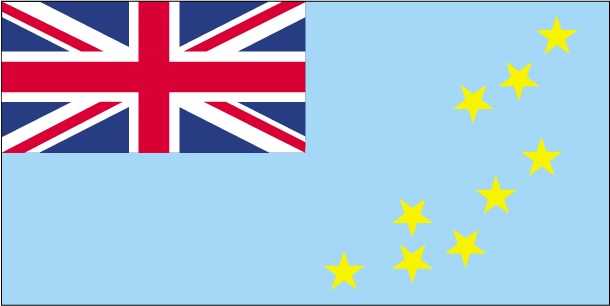Introduction
Background
Voyagers from either Samoa or Tonga first populated Tuvalu in the first millennium A.D. The UK declared a protectorate over islands in 1892 and merged them with the Micronesian Gilbert Islands. The Tuvaluan islands gained independence in 1978 as Tuvalu.
Geography
Area
total : 26 sq km
land: 26 sq km
water: 0 sq km
Climate
tropical; moderated by easterly trade winds (March to November); westerly gales and heavy rain (November to March)
Natural resources
fish, coconut (copra)
People and Society
Population
total: 11,733
Ethnic groups
Tuvaluan 97%, Tuvaluan/I-Kiribati 1.6%, Tuvaluan/other 0.8%, other 0.6% (2017 est.)
Languages
Tuvaluan (official), English (official), Samoan, Kiribati (on the island of Nui)
Religions
Protestant 92.7% (Congregational Christian Church of Tuvalu 85.9%, Brethren 2.8%, Seventh Day Adventist 2.5%, Assemblies of God 1.5%), Baha'i 1.5%, Jehovah's Witness 1.5%, other 3.9%, none or refused 0.4% (2017 est.)
Population growth rate
0.78% (2024 est.)
Government
Government type
parliamentary democracy under a constitutional monarchy; a Commonwealth realm
Capital
name: Funafuti; note - the capital is an atoll of some 29 islets; administrative offices are in Vaiaku Village on Fongafale Islet
Executive branch
chief of state: King CHARLES III (since 8 September 2022); represented by Governor General Tofiga Vaevalu FALANI (since 29 August 2021)
head of government: Prime Minister Feleti Penitala TEO (since 27 February 2024)
Legislative branch
description: unicameral House of Assembly or Fale I Fono (16 seats; members directly elected in single- and multi-seat constituencies by simple majority vote to serve 4-year terms)
Economy
Economic overview
upper middle-income Pacific island economy; extremely environmentally fragile; currency pegged to Australian dollar; large international aid recipient; subsistence agrarian sector; Te Kakeega sustainable development; domain name licensing incomes
Real GDP (purchasing power parity)
$59.202 million (2023 est.)
$57.006 million (2022 est.)
$56.622 million (2021 est.)
Real GDP per capita
$5,200 (2023 est.)
$5,000 (2022 est.)
$5,100 (2021 est.)
Agricultural products
coconuts, vegetables, tropical fruits, bananas, root vegetables, pork, chicken, eggs, pork fat, pork offal (2022)
Industries
fishing
Exports
$2.232 million (2022 est.)
$2.745 million (2021 est.)
$3.089 million (2020 est.)
Exports - partners
Thailand 69%, Croatia 21%, Philippines 4%, South Korea 2%, Japan 1% (2022)
Exports - commodities
fish, ships, computers, integrated circuits, nitrile compounds (2022)
Imports
$57.388 million (2022 est.)
$63.962 million (2021 est.)
$56.947 million (2020 est.)
Imports - partners
China 34%, Japan 27%, Fiji 20%, NZ 5%, Australia 5% (2022)
Imports - commodities
ships, refined petroleum, iron structures, engine parts, plastic products (2022)
Exchange rates
Tuvaluan dollars or Australian dollars (AUD) per US dollar -
Page last updated: Wednesday, July 24, 2024




